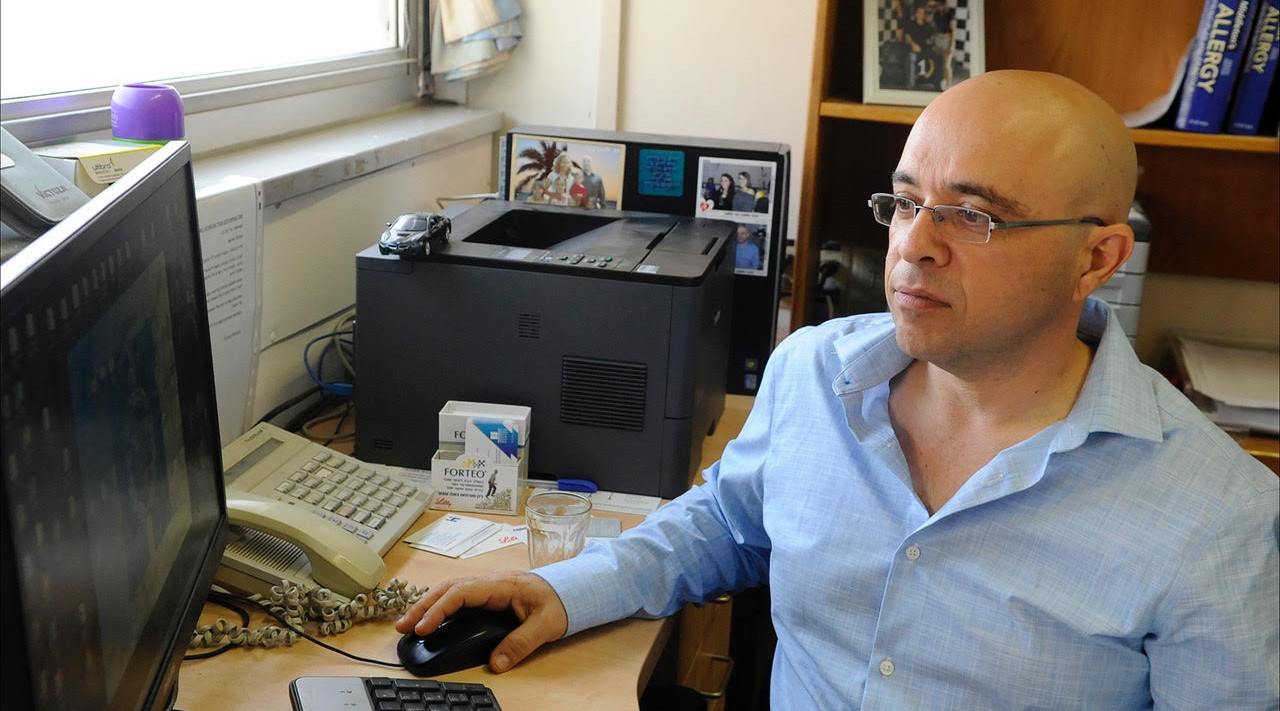JERUSALEM — A few months ago, 12-year-old A. happily posed for pictures atop a camel in the Judean Desert. He was shirtless under the midday sun.
For nearly any other Israeli boy, this may have been nothing more than a fun little episode on a family trip. But for A., the very fact that he was outside — bathed in bright sunshine and not protected by dark clothing — represented nothing short of a medical miracle.
A., whose full name is being withheld to protect his privacy, has a rare condition known as solar urticaria that makes him allergic to light. It’s an extremely rare disease, accounting for only 1 percent of all urticarias, or chronic hives. In A.’s case, it began when he was 5 and eventually became life-threatening.
“This is the most severe case I’ve ever heard of,” said Dr. Yuval Tal, director of the allergy and clinical immunology unit at Jerusalem’s Hadassah Hospital. “Usually they’re not so young, but this boy gradually developed systemic reactions, even after exposure to indoor artificial visible light.”
Solar urticaria results when exposure to invisible ultraviolet light causes certain skin cells to release histamine. In A.’s case, light would cause itchiness and a rash that rapidly spread across his skin. Sometimes he’d feel his throat closing up and would have trouble swallowing and breathing. He even went into anaphylactic shock.
“Some individuals are prone to have allergic reactions, but it almost never goes that far,” Tal said in an interview at his clinic at Hadassah’s Ein Kerem campus. “Chronic urticaria generally comes from some kind of immune dysregulation. In 50 percent of these patients, the disease resolves itself within one year, 70 percent within two years and 90 percent within five years.”
In A.’s case, the problem only worsened. The boy soon was carrying two EpiPens at all times, to be injected as a lifesaving measure in the case of overexposure.
His mother, a Jerusalem psychologist, first attributed her son’s itchy neck and arm rashes to the antibiotics A. was taking for his food allergies to dairy, potatoes and peaches.
“We already knew he was allergic to one type of antibiotic, so it seemed possible,” she said. “But it kept happening — and much more whenever we were outside. It started in areas where his skin was exposed to sunlight, but then it would spread everywhere.”
The family’s allergist advised A. to apply sunscreen and wear a hat, long pants and long-sleeved shirts when outdoors — a real challenge given Israel’s unrelenting sun and warm temperatures. Meanwhile, A. was referred to a dermatologist, Dr. Assi Levi, who confirmed that the boy was allergic not only to sunlight but to all visible light. That explained why sunscreen, which blocks invisible UV light, wasn’t helping.
Levi told his Hadassah colleague, Tal, about the boy, and Tal agreed to supervise his care.
“Probably everybody else was afraid to treat him,” Tal joked.
Then A. began to get sick at night, too.
One evening, after returning from Simchat Torah services indoors at Jerusalem’s brightly lit Great Synagogue, he had trouble breathing and swallowing. He quickly went into anaphylactic shock. His parents administered the EpiPen, called an ambulance and waited nervously as Hadassah doctors brought the emergency under control with medications.
With a better solution urgently needed, Tal decided to try Xolair — also known as omalizumab — a powerful medication that had been prescribed only for adults with severe allergic asthma.
“This drug had never been given to a child before, but we had no other choice,” Tal said.
It worked. Now A. gets injections in his arm every three weeks. Thanks to the treatment, he can walk outside in shorts and a T-shirt without any problem.
“I feel fine,” A. said. “Sometimes my ears get a bit red, and sometimes, toward the end of the period of the injection, some types of clothes become very itchy.”
His mother said she will be forever grateful to the doctors at Hadassah for figuring out a course of treatment that allows her son to experience the world like any other kid.
“I cannot express how amazing they’ve been in every sense of the word — partly because this is a situation that’s never happened before,” she said. “And even though it was contrary to everything they knew, they still listened. They were determined to give him a normal life.”
JTA has documented Jewish history in real-time for over a century. Keep our journalism strong by joining us in supporting independent, award-winning reporting.
This article was sponsored by and produced in partnership with Hadassah, The Women’s Zionist Organization of America. This article was produced by JTA’s native content team.
More from Hadassah





